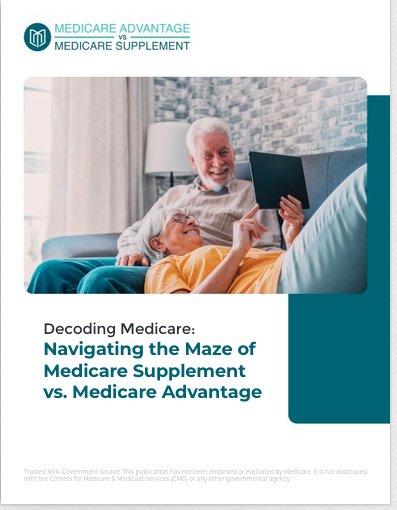Key Takeaways:
- Understanding the key differences between Medicare Supplement and Advantage Plans can lead to significant savings on your healthcare costs.
- Choosing the right plan requires careful consideration of factors like coverage options, network restrictions, and out-of-pocket expenses.
Medicare Supplement vs. Advantage Plans: Why Understanding Their Differences Could Save You Big
Choosing between Medicare Supplement (also known as Medigap) and Medicare Advantage Plans is a critical decision that can significantly impact your healthcare experience and finances. While both plans aim to fill gaps in Original Medicare, they operate in distinctly different ways. Understanding these differences is crucial to making an informed decision that best suits your needs and could save you a substantial amount in the long run.
What’s the Difference Between Medicare Supplement and Advantage Plans?
At first glance, Medicare Supplement and Medicare Advantage Plans might seem like two sides of the same coin, but they serve different purposes and work differently.
Medicare Supplement Plans are designed to complement Original Medicare (Parts A and B) by covering some of the out-of-pocket costs like copayments, coinsurance, and deductibles that Original Medicare doesn’t cover. These plans provide a standardized set of benefits across the board, meaning the coverage remains consistent regardless of the insurance company you choose.
Medicare Advantage Plans (Part C), on the other hand, are an alternative to Original Medicare. These plans are offered by private insurance companies approved by Medicare and provide all your Part A and Part B benefits, often including additional benefits like vision, dental, and prescription drug coverage. However, the trade-off for these added perks often includes restrictions on healthcare provider networks and varying out-of-pocket costs.
Why Does It Matter Which One You Choose?
The choice between Medicare Supplement and Medicare Advantage Plans matters because it determines not only your out-of-pocket costs but also your access to healthcare providers and how you receive care. With a Medicare Supplement Plan, you have the freedom to see any doctor who accepts Medicare, anywhere in the country, without needing referrals. This flexibility can be particularly valuable if you travel frequently or want to retain access to a wide range of specialists.
In contrast, Medicare Advantage Plans typically require you to use a network of doctors and hospitals. If you go outside this network, your costs may be higher, or the plan may not cover the services at all. While some people may appreciate the simplicity of having all their coverage managed under one plan with Medicare Advantage, others might find the network restrictions and potential out-of-pocket costs limiting.
How Do These Plans Handle Out-of-Pocket Costs?
Out-of-pocket costs are a significant factor in deciding between a Medicare Supplement and a Medicare Advantage Plan.
Medicare Supplement Plans help reduce or eliminate many of the out-of-pocket expenses that come with Original Medicare. For instance, Medigap policies can cover the Part A deductible and coinsurance for hospital stays, as well as the Part B coinsurance for outpatient services. The predictability of costs with a Medicare Supplement Plan is appealing to those who prefer to avoid unexpected medical expenses.
Medicare Advantage Plans, however, operate differently. While they often have lower premiums, they also have a different cost-sharing structure, with copayments, coinsurance, and an out-of-pocket maximum. The maximum out-of-pocket limit can provide some financial protection, but until you reach that limit, you may still face varying costs depending on the services you need and whether you stay within your plan’s network.
Can You Keep Your Doctor with Either Option?
One of the most common concerns when choosing between these two types of plans is whether you can keep your current doctor.
With Medicare Supplement Plans, you can see any doctor or specialist who accepts Medicare. There’s no need to worry about whether a particular provider is in-network because there are no networks to consider. This is a significant advantage if maintaining a long-standing relationship with your healthcare provider is important to you.
Medicare Advantage Plans, however, usually operate within a network of doctors and hospitals. If your current doctor is not in the plan’s network, you may have to switch providers or pay more to see your preferred doctor. Additionally, some Medicare Advantage Plans require referrals to see specialists, which could be an additional hurdle if you need specialized care.
Are Prescription Drugs Covered by Both Plans?
Prescription drug coverage is another key difference between Medicare Supplement and Medicare Advantage Plans.
Medicare Supplement Plans do not include prescription drug coverage. If you choose a Medigap policy, you’ll need to enroll in a separate Medicare Part D plan to cover your medications. This allows you to tailor your prescription drug coverage to your specific needs, but it also means managing two separate plans.
Most Medicare Advantage Plans, on the other hand, include prescription drug coverage (MAPD). Having drug coverage bundled with your medical coverage under one plan can be more convenient, but it’s important to review the plan’s formulary (the list of covered drugs) to ensure that your medications are covered and to understand any associated costs.
Which Plan Offers More Flexibility for Travelers?
If you travel frequently, especially out of state, the flexibility of your health insurance plan is a critical consideration.
Medicare Supplement Plans offer nationwide coverage, meaning you can use your benefits anywhere in the United States as long as the provider accepts Medicare. This makes Medigap policies particularly appealing to snowbirds or anyone who spends significant time in different parts of the country throughout the year.
Medicare Advantage Plans, however, tend to be more restrictive. Many are HMO or PPO plans with networks that are regionally based. While some plans may offer out-of-network coverage, it usually comes at a higher cost, and coverage outside the plan’s service area may be limited to emergency or urgent care. If you travel frequently, you’ll need to carefully consider whether a Medicare Advantage Plan meets your needs.
What Are the Enrollment Rules for Each Plan?
The enrollment rules for Medicare Supplement and Medicare Advantage Plans differ, and understanding these rules can help you avoid potential penalties or gaps in coverage.
You can enroll in a Medicare Supplement Plan anytime, but the best time to do so is during your Medigap Open Enrollment Period. This six-month period begins the month you turn 65 and are enrolled in Medicare Part B. During this time, you have guaranteed issue rights, meaning you can buy any Medigap policy available in your state without medical underwriting or being charged higher premiums due to pre-existing conditions.
Enrolling in a Medicare Advantage Plan is typically done during specific enrollment periods. The Initial Enrollment Period is your first opportunity, beginning three months before you turn 65 and ending three months after. There’s also an Annual Enrollment Period from October 15 to December 7 each year, during which you can switch between Medicare Advantage Plans or return to Original Medicare. If you switch back to Original Medicare and want a Medicare Supplement Plan, you may be subject to medical underwriting if you’re outside your Medigap Open Enrollment Period.
When Should You Consider Switching Plans?
There may be times when your healthcare needs or financial situation change, leading you to reconsider your current Medicare coverage. Knowing when to switch between Medicare Supplement and Medicare Advantage Plans can be beneficial.
If you find that your current Medicare Advantage Plan’s network restrictions are too limiting or your out-of-pocket costs are too high, you might consider switching to a Medicare Supplement Plan during the Annual Enrollment Period. On the other hand, if you’re enrolled in a Medigap policy and find the premiums becoming unaffordable, or you want the additional benefits like vision or dental coverage that many Medicare Advantage Plans offer, you might consider making the switch.
However, switching from Medicare Advantage to a Medigap policy after your Medigap Open Enrollment Period might involve medical underwriting, which could result in higher premiums or denial of coverage based on your health. Carefully consider your options and consult with a licensed insurance agent to explore the best plan for your current needs.
Making the Right Choice
Choosing between a Medicare Supplement and a Medicare Advantage Plan requires a thorough understanding of how each plan works and how they align with your healthcare needs and lifestyle. While both options provide valuable benefits, the right choice can vary greatly depending on your circumstances. Consider your healthcare needs, financial situation, and preferences when making your decision. Understanding these differences now can help you avoid unnecessary expenses and ensure that you have the coverage you need.
Contact Information:
Email: [email protected]
Phone: 7145553456









